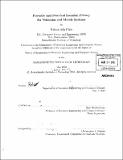Provable and practical location privacy for vehicular and mobile systems
Author(s)
Popa, Raluca Ada
DownloadFull printable version (7.887Mb)
Alternative title
Practical and provable privacy for location-based vehicular services
Other Contributors
Massachusetts Institute of Technology. Dept. of Electrical Engineering and Computer Science.
Advisor
Hari Balakrishnan.
Terms of use
Metadata
Show full item recordAbstract
In recent years, there has been a rapid evolution of location-based vehicular and mobile services (e.g., electronic tolling, congestion pricing, traffic statistics, insurance pricing, location-based social applications), which promise tremendous benefits to users. Unfortunately, most such systems pose a serious threat to the location privacy of users because they track each individual's path. A question that arises naturally is how can we preserve location privacy of users while maintaining the benefits of such services? In this thesis, we address this question by tackling two general problems that are the foundation of many of the aforementioned services. The first problem is how to enable an untrusted server to compute agreed-upon functions on a specific user's path without learning the user's path. We address this problem in a system called VPriv. VPriv supports a variety of applications including electronic tolling, congestion pricing, insurance premium computation, and some kinds of social applications. The second problem is how to enable an untrusted server to compute aggregate statistics over all users' paths without learning any specific user's path. We tackle this problem in a system called PrivStats. With PrivStats, one can compute statistics such as traffic statistics (e.g., average speed at an intersection, average delay on a road, number of drivers at a location) or average ratings of a location in a social application. The computation and threat models for VPriv and PrivStats are different, and required markedly different solutions. For both systems, we provide formal definitions of location privacy and prove that our protocols achieve these definitions. We implemented and evaluated both systems, and concluded that they are practical on commodity hardware and smartphones.
Description
Thesis (M. Eng.)--Massachusetts Institute of Technology, Dept. of Electrical Engineering and Computer Science, 2010. Cataloged from PDF version of thesis. Includes bibliographical references (p. 87-91).
Date issued
2010Department
Massachusetts Institute of Technology. Department of Electrical Engineering and Computer SciencePublisher
Massachusetts Institute of Technology
Keywords
Electrical Engineering and Computer Science.